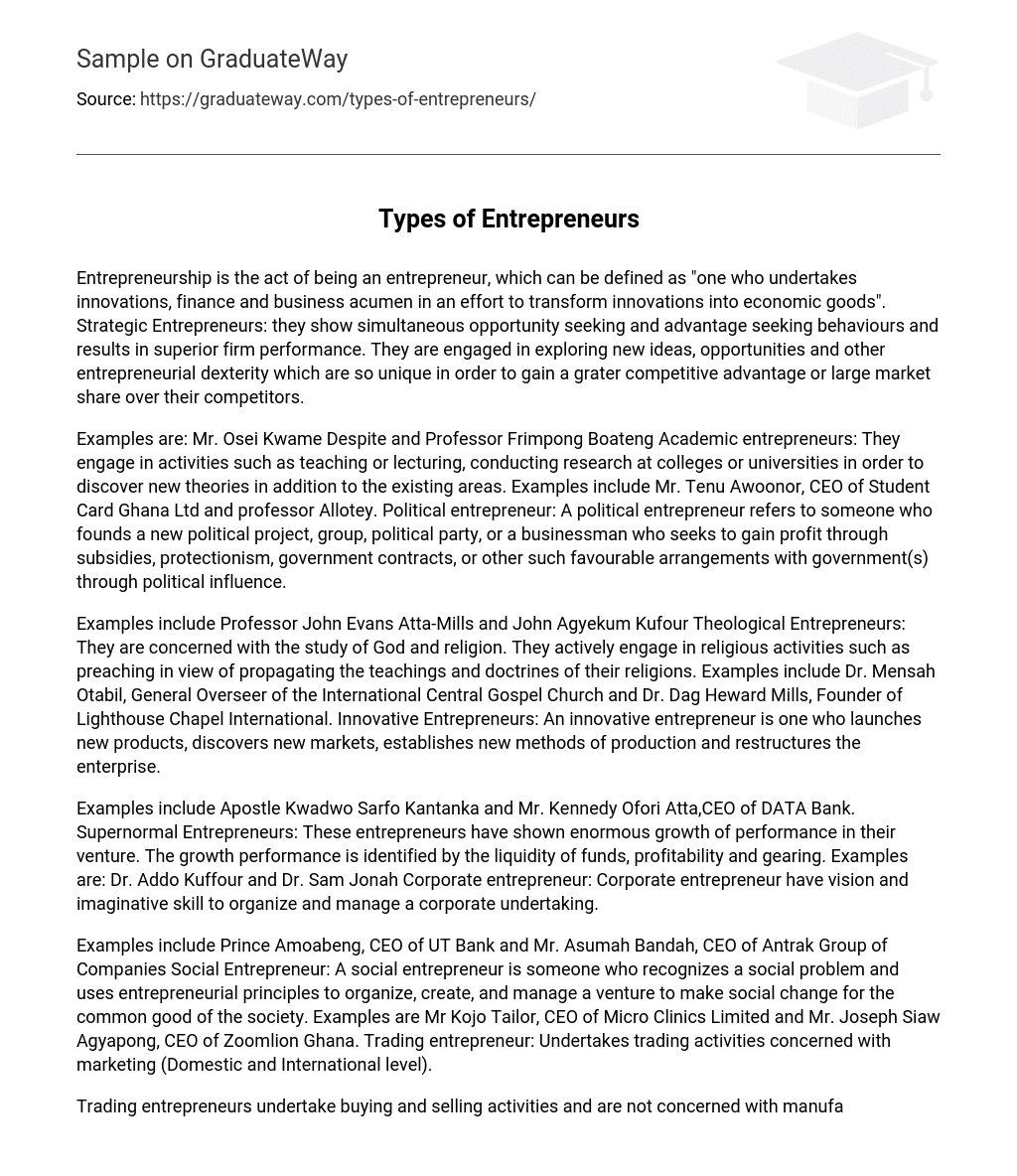Entrepreneurship is the act of being an entrepreneur, which can be defined as “one who undertakes innovations, finance and business acumen in an effort to transform innovations into economic goods”. Strategic Entrepreneurs: they show simultaneous opportunity seeking and advantage seeking behaviours and results in superior firm performance. They are engaged in exploring new ideas, opportunities and other entrepreneurial dexterity which are so unique in order to gain a grater competitive advantage or large market share over their competitors.
Examples are: Mr. Osei Kwame Despite and Professor Frimpong Boateng Academic entrepreneurs: They engage in activities such as teaching or lecturing, conducting research at colleges or universities in order to discover new theories in addition to the existing areas. Examples include Mr. Tenu Awoonor, CEO of Student Card Ghana Ltd and professor Allotey. Political entrepreneur: A political entrepreneur refers to someone who founds a new political project, group, political party, or a businessman who seeks to gain profit through subsidies, protectionism, government contracts, or other such favourable arrangements with government(s) through political influence.
Examples include Professor John Evans Atta-Mills and John Agyekum Kufour Theological Entrepreneurs: They are concerned with the study of God and religion. They actively engage in religious activities such as preaching in view of propagating the teachings and doctrines of their religions. Examples include Dr. Mensah Otabil, General Overseer of the International Central Gospel Church and Dr. Dag Heward Mills, Founder of Lighthouse Chapel International. Innovative Entrepreneurs: An innovative entrepreneur is one who launches new products, discovers new markets, establishes new methods of production and restructures the enterprise.
Examples include Apostle Kwadwo Sarfo Kantanka and Mr. Kennedy Ofori Atta,CEO of DATA Bank. Supernormal Entrepreneurs: These entrepreneurs have shown enormous growth of performance in their venture. The growth performance is identified by the liquidity of funds, profitability and gearing. Examples are: Dr. Addo Kuffour and Dr. Sam Jonah Corporate entrepreneur: Corporate entrepreneur have vision and imaginative skill to organize and manage a corporate undertaking.
Examples include Prince Amoabeng, CEO of UT Bank and Mr. Asumah Bandah, CEO of Antrak Group of Companies Social Entrepreneur: A social entrepreneur is someone who recognizes a social problem and uses entrepreneurial principles to organize, create, and manage a venture to make social change for the common good of the society. Examples are Mr Kojo Tailor, CEO of Micro Clinics Limited and Mr. Joseph Siaw Agyapong, CEO of Zoomlion Ghana. Trading entrepreneur: Undertakes trading activities concerned with marketing (Domestic and International level).
Trading entrepreneurs undertake buying and selling activities and are not concerned with manufacturing work. Examples include TT Brothers and Mr. Kofi Eshun, CEO of Dukes Oil (Oil marketing firm) Industrial entrepreneur: They undertake manufacturing activities. Industrial entrepreneur sets up an industrial unit and complies with necessary formalities of getting a license, power connection, and pollution control clearance, arrange initial capital, provides securities and guarantees to the financial institution. Examples include Ameen Sangari and Lawyer Kwaku Kyeremateng of Commet Property.
REFERENCE:
•Thomas W Zimmerer, Norman M. Scarborough (2008), Essentials of Entrepreneurship and Small Businesses Management, 5th Edition, Pearson Education, Inc. , Upper Saddle River, Newjersey •GS Sudha (2007), Dynamic of Business Entrepreneurship, RBSA Publishers, Jaipur, •Jay Conrad Levinson, Guerrilla Marketing: Secrets for Making Big Profits from Your Small Business (New York: Houghton Mifflin, 1998). •Peter Schwartz, Inevitable Surprises: Thinking Ahead in a Time of Turbulence (New York: Gotham Books, 2003).





